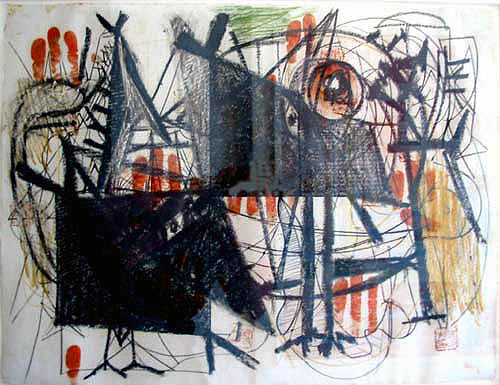Description
The work "Hitler invades Poland - 1939" by Arshile Gorky is a powerful testimony of the tumultuous historical context that surrounds her and the innovative style of the artist. Gorky, a central figure in the development of abstract art in the United States during the twentieth century, imparts a deep emotional burden that transcends its visual composition. Created in the year in which World War II began, the work reflects not only a crucial moment in world history, but also Gorky's intense response to violence and human suffering.
When observing the painting, the viewer faces a deployment of organic and gestural forms that seem to disrupt the conventional space. Gorky uses a colored palette that ranges between dark and gloomy shades, interrupted by flash of more vivid colors that manage to capture attention. These chromatic contrasts could be interpreted as a representation of the internal and external struggle that was lived at that time. The use of color is not simply decorative; It is an emotional language that evokes the chaos of the invasion and the imminent threat that Nazism represented.
The composition, although abstract, seems to suggest figures in an environment in constant tension. Forms can evoke the presence of characters mired in desolation or war forces that unleash horror, although they are not directly represented. This indirect approach contributes to increasing the symbolic burden of the work, allowing the spectator's imagination to complete the narrative from his own historical experience and knowledge. This aspect is characteristic of Gorky's work, which is distinguished by the ability to evoke deep emotions through abstraction.
Gorky's background is equally important when considering this work. Born in Armenia and transferred to the United States, his life was marked by tragedy and loss. These experiences influenced his work, providing it with a sensitivity that is palpable in "Hitler invades Poland - 1939". Painting not only acts as a historical document, but also as a sign of existential anguish that has accompanied humanity throughout its history.
Gatchy's style can be located at an intersection between surrealism and abstract expressionism. While many of his contemporaries sought non -representation, Gorky enters a space where the shape and color communicate a message beyond words. Their influences are evident in the fluidity of the lines and the transformation of the figures, which seem to escape a rigid order towards a field of infinite possibilities. This treatment of the form is something that can also be observed in works by other artists of their time, such as Wassily Kandinsky and Joan Miró, who also explored the deep connection between art and subconscious.
"Hitler invades Poland - 1939" is, therefore, more than a work of art to use; It is a reflection of Gatchy himself and a critical moment in the history of mankind. His enigmatic and emotional visual language invites the viewer to explore not only the impressions it generates, but also the social, political and personal context that feeds it. Thus, the work becomes a conversation itself, a mediator between the past and the present, and a reminder of the lessons that history continues to offer us.
KUADROS ©, a famous paint on your wall.
Hand-made oil painting reproductions, with the quality of professional artists and the distinctive seal of KUADROS ©.
Art reproduction service with satisfaction guarantee. If you are not completely satisfied with the replica of your painting, we refund your money 100%.

